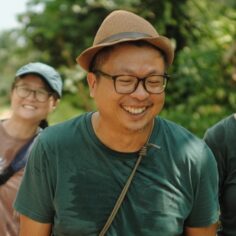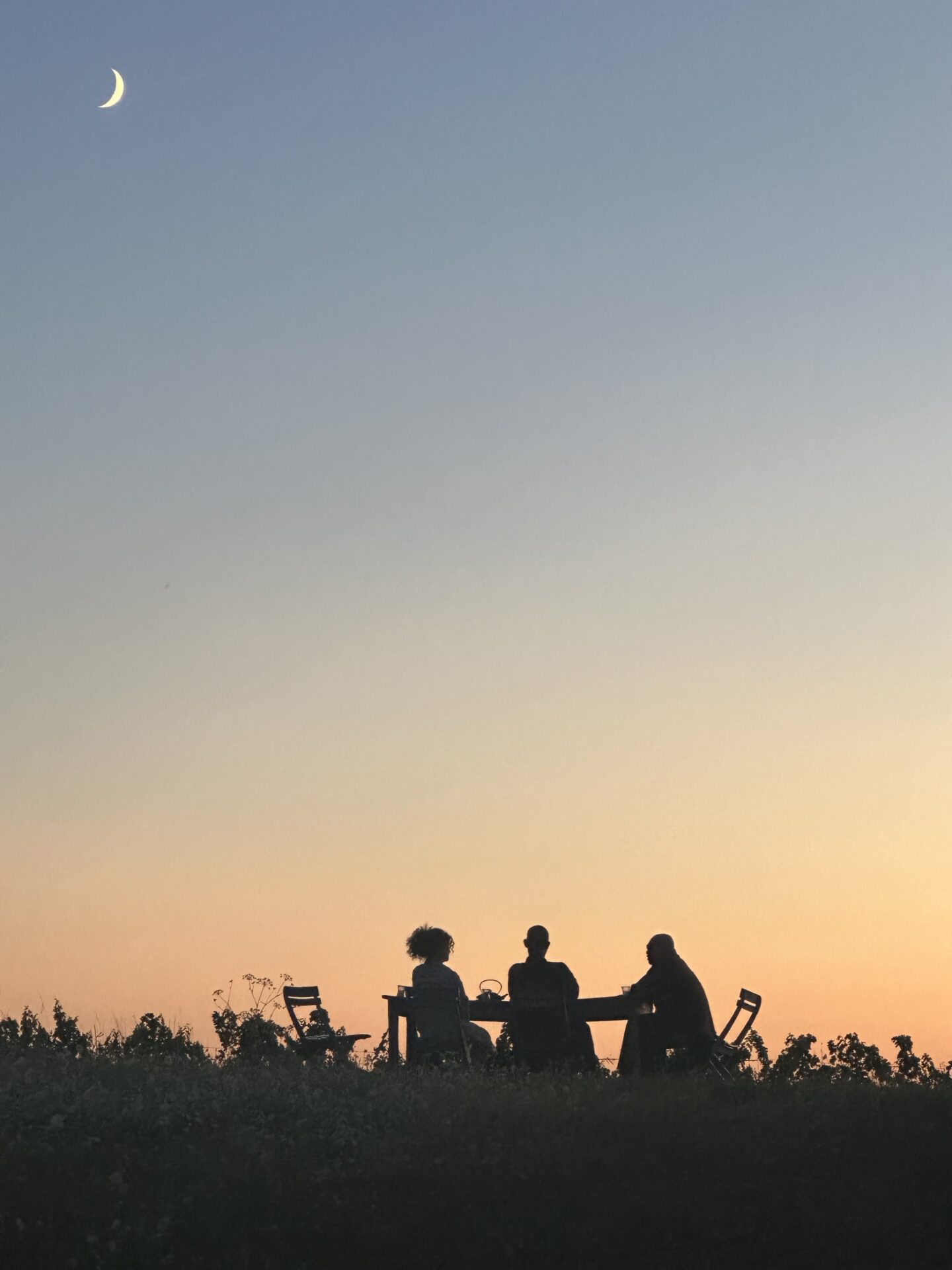Order of Interbeing member Will Chua finds a way of interbeing inspired by giving, living simply, growing food with others, and tenderness.
By Will Chua on
1 May 2025
Dear Respected Thầy,
Dear Beloved Community,
Hope this finds you smiling and at ease. Aren’t these great moments of practice, and moments of great practice for us all?
Order of Interbeing member Will Chua finds a way of interbeing inspired by giving, living simply, growing food with others, and tenderness.
By Will Chua on
1 May 2025
Dear Respected Thầy,
Dear Beloved Community,
Hope this finds you smiling and at ease. Aren’t these great moments of practice, and moments of great practice for us all?
Realities of a lay practitioner
It has been thirteen years since the river of Plum Village flowed into my being, healing a broken heart and battered life. Now, reflecting on the theme of community building in divisive times, one realization comes immediately to mind: being a lay practitioner is not easy!
Fulfilling perhaps, but not easy, for at least three reasons:
- I am part of multiple communities that do not really overlap, needing energy and attention, often at the same time!
- Each community is often divided along multiple lines: views, beliefs, culture, religion, background, status, etc. The divisions, even if tolerable, can be draining and require energy and practice. Most people I interact with have not committed to the Mindfulness Trainings or Six Harmonies!
- I find myself having to constantly switch between “practice” and “participate” in these communities, sometimes on the fly. There are no agreed daily practice schedules or sharing circle guidelines!
Here, I am still very much in love and involved with Joyful Garden Sangha Singapore. We are a growing fifteen-year-old spiritual family with dedicated caretakers, mentored by wonderful Dharma teachers, filled with many opportunities for practice, from daily morning sits to weekly group practices, from monthly Days of Mindfulness to yearly retreats.
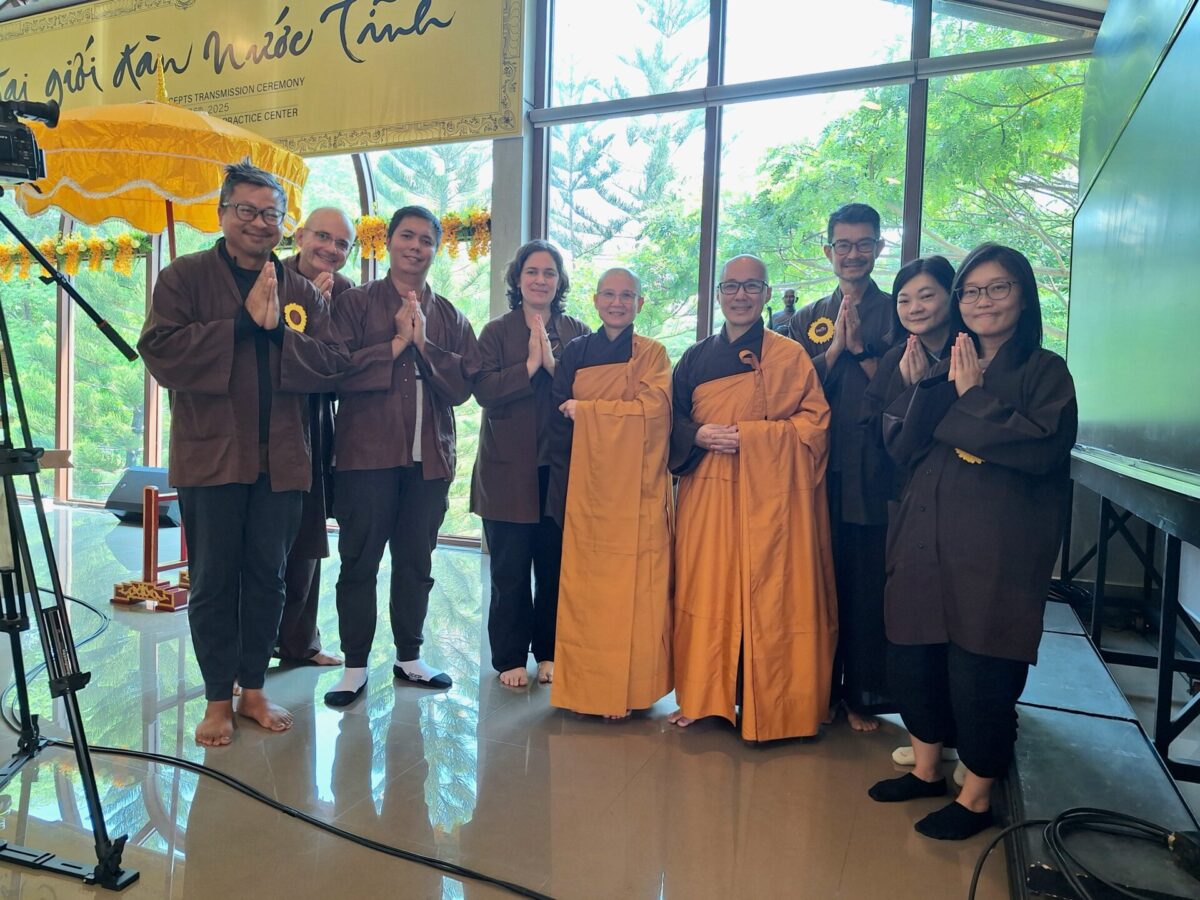
Energetically, however, the local sangha is also not always a place of refuge. Despite much involvement, time with the sangha remains a small part of my waking hours, compared to interaction with family, farm, and friend circles. Sometimes when difficulties arise in the sangha (and there are quite a few), practice sessions are not always nourishing. Also, in order to support and hold space when newer people come to the sangha with deep suffering, we often have to be in touch with other resources that are available in our personal practice outside the sangha, or simply take a break.
As Sister Lương Nghiêm once clearly pointed out to us in a Dharma teaching, “As an OI (Order of Interbeing) member, how can you have the capacity and energy to show up and serve the sangha, when you don’t have enough peace at home and at work?”
So, what helps outside of sangha? I am feeling grateful for this chance to reflect and share.
A simple life of giving
I received The Five Mindfulness Trainings at the European Institute of Applied Buddhism (EIAB) in 2013 with the lineage name Pāramitā Hridaya, Crossing to the Other Shore of the Heart. Sister True Dedication looked at me with a cheeky smile and said, “Dear Will, you have to practice not only The Five Mindfulness Trainings, but the Six Pāramitās too. Good luck!”
Thầy’s words on Dāna Pāramitā, the perfection of giving, came alive in my heart as I embarked on a new livelihood as a farmer:
There is a plant, well-known in Asia—it is a member of the onion family, and it is delicious in soup, fried rice and omelets—that grows back in less than twenty-four hours every time you cut it. And the more you cut it, the bigger and stronger it grows. This plant represents dāna pāramitā. We don’t keep anything for ourselves. We only want to give. When we give, the other person might become happy, but it is certain that we become happy.1
So I gave it a shot. For the last thirteen years, I have practiced never asking for a salary or anything else in return for my time and energy, whether it is working on our community farms, helping out family and friends, or in the sangha. Every day, I try to:
- Connect with gratitude by maintaining awareness of all that is gifted in the present moment unconditionally, all the conditions I already have.
- Respond to this gratitude by doing my best to gift my time, energy, and resources with understanding, whether at home, at work, or in third spaces. And when in doubt, just give first, even if it is a small jar of turmeric or a small prayer for wellness!
- Receive wholeheartedly any gifts offered for my needs, nourishing more gratitude.
- Repeat steps 1 to 3.
Thirteen years on, and wow, I am still here! Every day, there is food to eat, everywhere there are beds to sleep on, and in every corner there are friendships, kinships. My bank account has never gotten rich, but it has never been empty. Internally, there is a deeper trust in Life. Externally, there is a deeper trust in the kindness of others. If we consider that on average all the cells in our body are renewed every seven years, then every cell in my body has been the result of someone’s generosity, almost twice over!
More importantly, I find that whenever there is a misunderstanding among loved ones, tension in views amongst farm colleagues, or trouble in the sangha, there is a deep well of Trust to draw from, given this way of living. Firewood for winter, as Thầy would say. Even in the midst of frustration, people give our relationship a chance; connections remain warm enough for dialogue.
How many times has Thầy invited us to live a simple life? When I received this teaching, I always thought that I first had to simplify my life in order to have time and space to give, to serve. Now I realize this is only partly right. Yes, a simple life gives us more time and space to give, but a life of giving also creates conditions for a simple life. A simple life and giving inter-are. More and more, I feel safer without many possessions. Mutual care is activated, I entrust my life to the relationships I am in, and they entrust themselves to me.
The practice of true giving also constantly invites us to understand how to give skilfully and appropriately, to keep our heart sensitive and listening. This understanding sparks gratitude instead of guilt, and keeps the fire of compassion alive in our heart—bringing about contentment and meaning, more patience, and the need for less. I understand more deeply now why Thầy also taught:
If you are capable of lessening the suffering around you, then you are also capable of living a simple life.2
A simple life of giving, therefore, continues to be a living question, a daily practice, a constant awareness, as I engage in the communities around me. Trust spirally grows. Trust in Life, trust in a life that is useful, trust in the kindness of others, and trust in an open heart in times of trouble. I pray conditions continue to be favorable for me, and for you too.
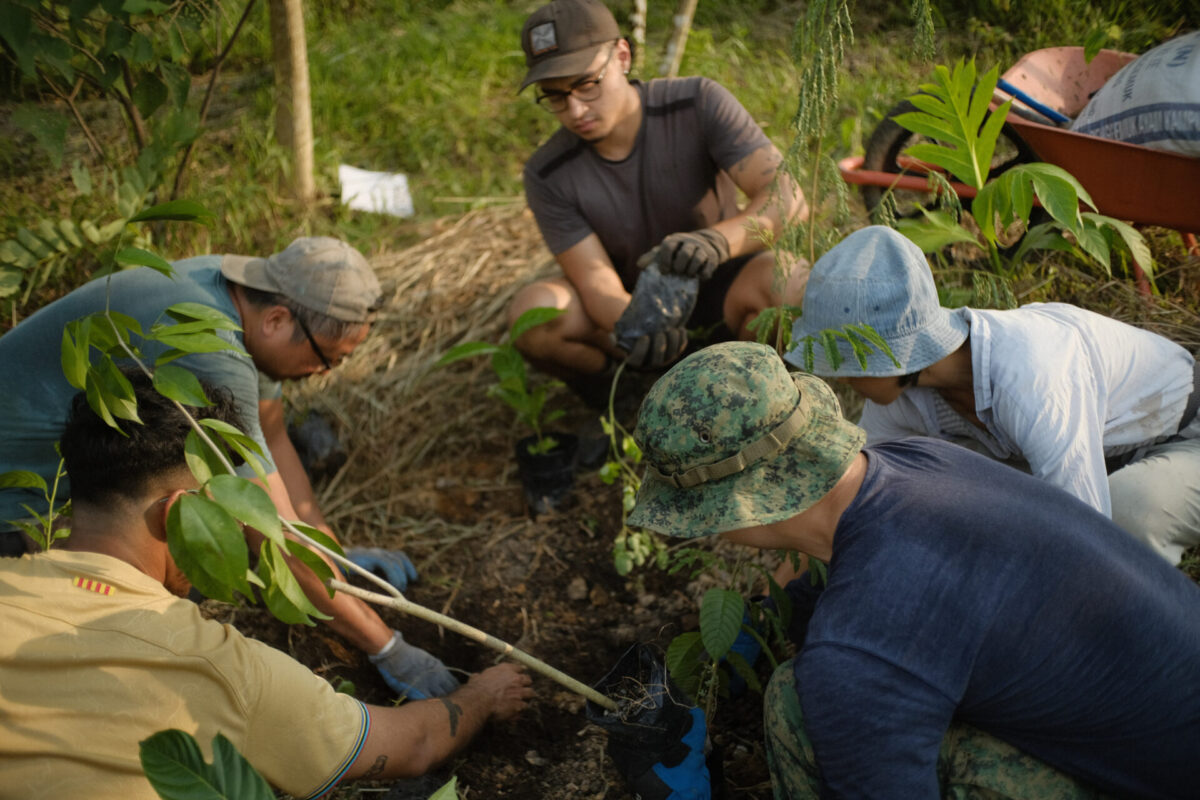
Growing a food forest with friends from different faiths
I live in Malaysia, where 64% of the people are Muslim. Five years ago, during COVID, some friends and I embarked on A Little Wild, a 200-year project to heal and transform 138 acres of degraded oil palm land into a tropical food forest, for our community and for Mother Earth. Today, our farm community includes devout Muslims, Christians, free thinkers, and Plum Village practitioners from all kinds of backgrounds.
Even on a project as sacred as this, our diverse backgrounds bring friction. Power versus consensus. Reverence for Life versus animal sacrifice. Exclusive versus inclusive. Self-sufficiency versus Interbeing. Original Sin versus Buddha Nature. Hope versus despair. The role of women. All our different views make their way, often unconsciously, into everyday decision-making, conversations with people, and attitudes, causing misunderstanding, tension, and sometimes hurt.
There are times of difficulty when I find myself thinking, “I wish everyone was a Plum Village practitioner!” But it does not take long to see that thinking this way creates more, not less, division and suffering, inside and around. Rather, what has really helped keep our community harmonious enough, happy enough, on this long tough road of regenerative farming, is the energy of insight.
An insight, transmitted by Thầy, surfaced one day during a deep discussion about belief in God. I found myself sharing, emotionally, with our Muslim cofounder: “My only wish, brother, is that my presence on the farm will contribute in small ways to you being a better Muslim, and for your presence to help me be a better person. Same for Christian siblings and friends of other faiths.”
There was a sense of peace and ease in the circle, which I believe our bodies remember. Ever since, reminding each other of this has created good conditions for safety, trust, and freedom as we work together.
Another insight was transmitted by Mother Earth. A few years back, while I was in a mood of reflection on the farm, these words came to heart: Every land’s dream is to be a forest.
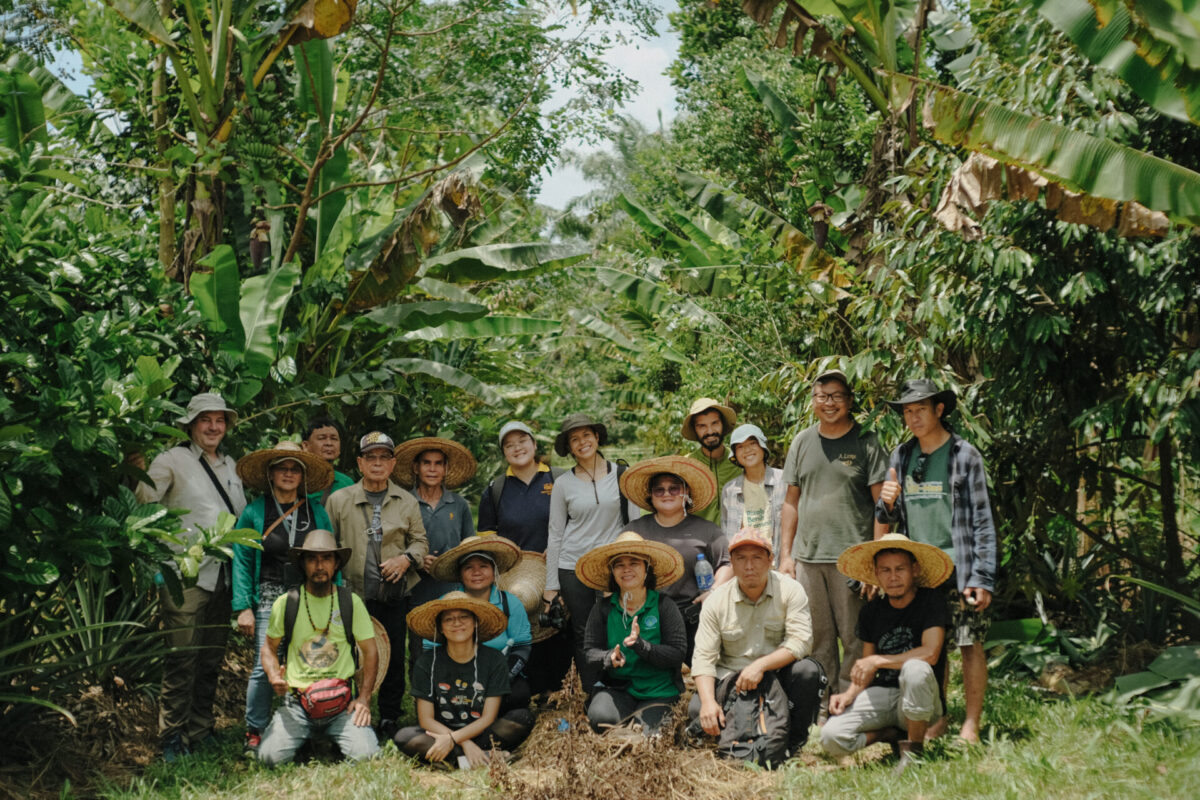
We are not just individuals. We are not just part of a human community. We are living, breathing organs in a macro-organism, a macro-organism dreaming to realize its full potential: to be a thriving tropical forest again, creating and supporting all life.
Our true sangha is a big family of microbes, insects, plants, animals, humans, minerals, and mystery—interwoven and interbeing towards this dream of increasing Life, while always “announcing our place in the family of things,” as Mary Oliver said.3
This insight, this deep aspiration, is now on our farm website and is mentioned on our farm tours, guiding our hearts through tougher times. We can feel the energy of this insight even on degraded land: every day, another being becomes compost, another bird brings seed, another grass leaf shoots up to harvest the sun and slow the rain. Every time we are called to plant a new tree, or prune a dead branch to cover the soil, joy awakens: joy in knowing our place in the family of things, the joy of fulfilment, of belonging to a path leading to a forest. This joy keeps us together.
How precious, in these times, to be a multifaith community regenerating our Forest Body together.
The energy of insight awakens a collective heart, and sustains collective action, until another one manifests. With each one, we dream and lean more into the Ultimate, while feeding the cats, cutting the grass, and fixing a water pipe. Aren’t we lucky to have inherited so many insights from Thầy, and to have a practice that encourages us to germinate our own?
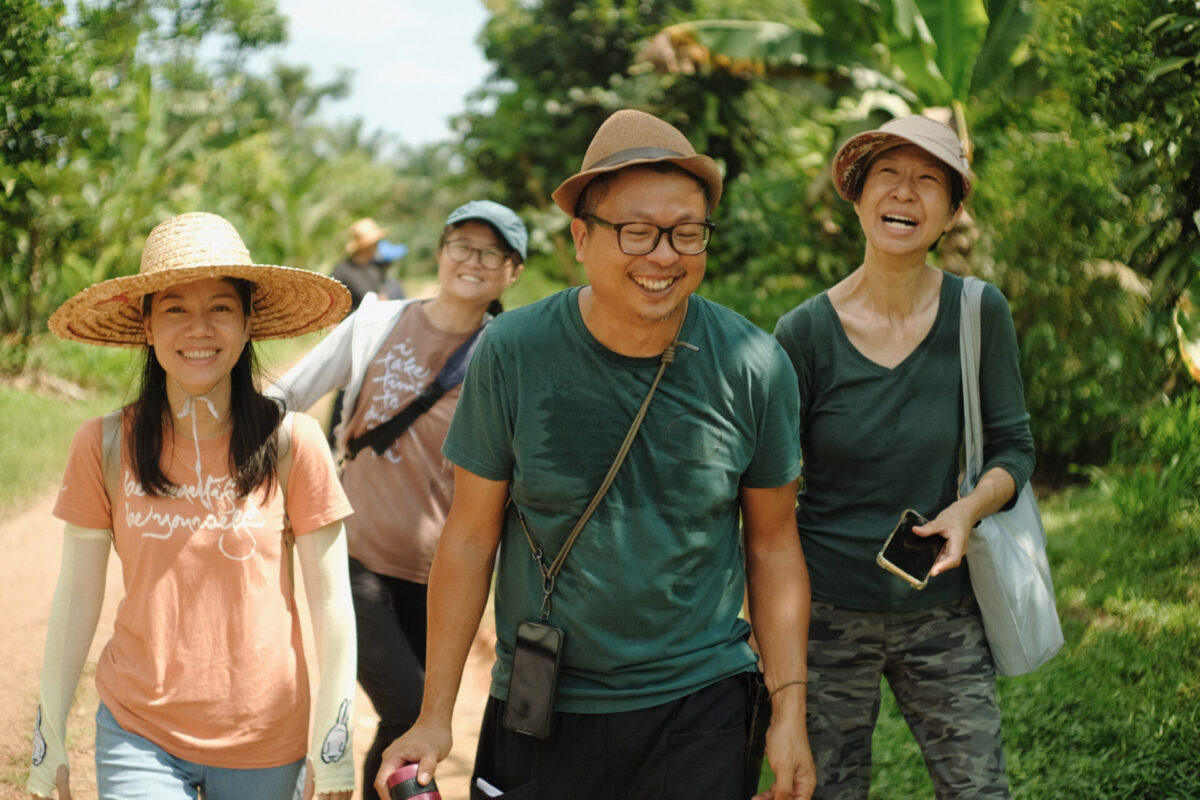
Tone of voice
At home, this is also my thirteenth year of choosing to situate a more spiritual life close to my aging mum, family members, and old friends. Imagine a warm community, but also loud, contentious, carnivorous, believing in making money and enjoying life through all levels of consumption. Every day, I continue to have a chance to face resistance in my heart: an invitation to another family seafood dinner, family obligations to Taoist rites, visits to the casino, giving iPads to the children, mahjong sessions, constant news reports on the living room TV, and so on. The balance between belonging and boundary can be hard to keep.
One day a few years back, after an argument with my mum, I hid in my room, angry at my anger. After sending out a phone message of apology to her, I sat on my cushion, wondering why I was still capable of acting out like that.
A question then came to heart: How am I talking to myself now? What is the tone of voice?
I picked up my phone, went to tnhaudio.org, and randomly clicked on one of Thầy’s talks. It was a Q&A session, and a lay sister was asking him about her difficulties with her husband. As Thầy began to speak, I started crying uncontrollably, my heart feeling a deep warm relief. I had no idea what he said exactly, but I remember feeling his tone, that gentleness and warmth. I remember hearing a rhythm of speaking, a repetition of the phrase, “in such a way.” Can you still breathe in such a way, can you still drink tea in such a way?
Dear sangha, how many times have Thầy and many of our Dharma teachers invited us with this phrase in such a way? To let go of the personal content, and to rest in the process of loving awareness, a way of being, towards all that unfolds in the moment?
Every morning in the house since then, I’ve happily taken over from my mum our family Taoist ritual of praying to the Sky and Earth Gods. At the balcony, I breathe and look at the sky, thanking Mother Earth and Father Sun, before offering an incense on the Sky God altar. Going inside, I offer an incense to the left ancestral altar, where I have printed out pictures of my late father and grandparents. I offer another incense on the right altar, with pictures of my maternal grandparents. I offer the final incense in the middle, where Mum has allowed me to place a small Buddha statue, a small picture of Thầy, and a crystal engraving of the Heart Sutra from my late godmother. I touch the picture of Dad, then Grandma, recite the opening gatha on bowing, then kneel down and touch the earth three times to the Three Jewels. What was once a meaningless, obligatory ritual comes alive. Mum is happy, I am happy, the day becomes new.
Dear sangha, thank you so much for reading. I wish to end this surprisingly long letter to you now, with the words of a simple song that came from that day. I pray that wherever we find ourselves, we are able to think, speak, and act in such a way that all situations become alive with understanding and love, with the perfume of Plum Village, continuing the gentle spirit of our teachers.
In Such a Way
Breathe, in such a way,
We come back home, to the here and now.
Breathe, in such a way,
Our body can rest, and heal again.
Walk, in such a way,
Every step, is kissing the Earth.
Walk, in such a way,
Every step, says Yes to Life.
Love, in such a way,
The one we love, feels warm and free.
Love, in such a way,
We understand, our interbeing.
Smile, in such a way,
Curiously touch, the wonders of life
Smile, in such a way,
Gently embrace, our joy and pain.
Speak, in such a way,
Flowers bloom, in every heart.
Listen, in such a way,
Like receiving a child, with open arms.
Love, in such a way,
The one we love, feels warm and free.
Love, in such a way,
We understand, our interbeing.
In love and trust,
Will
P.S. If you would like to hear a song version, I believe there is a recording on the Stream Entering Monastery’s YouTube channel. Or please write to me at khisui@gmail.com. I would love to connect.
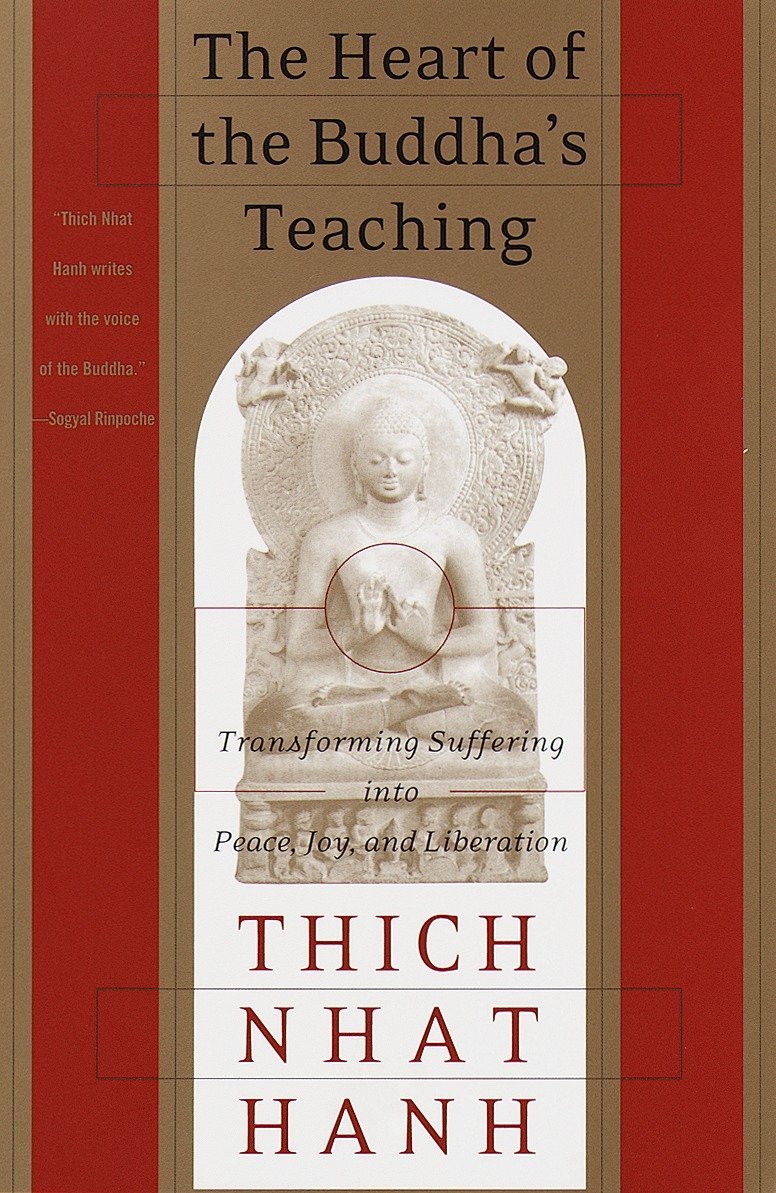
1 Thích Nhất Hạnh, The Heart of the Buddha’s Teaching: Transforming Suffering into Peace, Joy, and Liberation (Berkeley: Parallax Press, 1998), 194.
2 Plum Village App, 2024, “Meaningful Life | Teaching by Thich Nhat Hanh” YouTube, https://www.youtube.com/watch?v=KAR55vBpd0Q.
3 Mary Oliver, “Wild Geese,” Devotions: the Selected Poems of Mary Oliver (New York: Penguin Press, 2017), 347.
